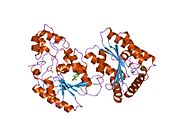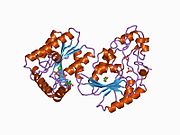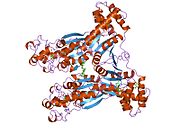PFKFB4: Difference between revisions
expansion |
m Open access bot: doi updated in citation with #oabot. |
||
| (27 intermediate revisions by 14 users not shown) | |||
| Line 1: | Line 1: | ||
{{Short description|Protein-coding gene in the species Homo sapiens}} |
|||
{{protein |
|||
{{Infobox_gene}} |
|||
| Name = 6-phosphofructo-2-kinase/fructose-2,6-biphosphatase 4 |
|||
| caption = |
|||
| ⚫ | '''6-phosphofructo-2-kinase/fructose-2,6-biphosphatase 4''' also known as '''PFKFB4''' is an [[enzyme]] which in humans is encoded by the ''PFKFB4'' gene.<ref name="pmid8830046">{{cite journal | vauthors = Sakai A, Kato M, Fukasawa M, Ishiguro M, Furuya E, Sakakibara R | title = Cloning of cDNA encoding for a novel isozyme of fructose 6-phosphate, 2-kinase/fructose 2,6-bisphosphatase from human placenta | journal = Journal of Biochemistry | volume = 119 | issue = 3 | pages = 506–11 | date = March 1996 | pmid = 8830046 | doi = 10.1093/oxfordjournals.jbchem.a021270 }}</ref><ref name="pmid10095107">{{cite journal | vauthors = Manzano A, Pérez JX, Nadal M, Estivill X, Lange A, Bartrons R | title = Cloning, expression and chromosomal localization of a human testis 6-phosphofructo-2-kinase/fructose-2,6-bisphosphatase gene | journal = Gene | volume = 229 | issue = 1–2 | pages = 83–9 | date = March 1999 | pmid = 10095107 | doi = 10.1016/S0378-1119(99)00037-2 }}</ref> |
||
| image = |
|||
| width = |
|||
| HGNCid = 8875 |
|||
| Symbol = PFKFB4 |
|||
| AltSymbols = |
|||
| EntrezGene = 5210 |
|||
| OMIM= 605320 |
|||
| RefSeq= NM_004567 |
|||
| UniProt= Q16877 |
|||
| PDB= |
|||
| ECnumber= |
|||
| Chromosome=3 |
|||
| Arm=p |
|||
| Band=22 |
|||
| LocusSupplementaryData=-p21 |
|||
}} |
|||
| ⚫ | |||
== Function == |
== Function == |
||
The bifunctional 6-phosphofructo-2-kinase ({{EC number|2.7.1.105}})/fructose-2,6-bisphosphatase ({{EC number|3.1.3.46}}) (PFKFB) regulates the steady-state concentration of [[fructose 2,6-bisphosphate]], an activator of a key regulatory enzyme of [[glycolysis]], [[phosphofructokinase]]. |
The bifunctional 6-phosphofructo-2-kinase ({{EC number|2.7.1.105}})/fructose-2,6-bisphosphatase ({{EC number|3.1.3.46}}) (PFKFB) regulates the steady-state concentration of [[fructose 2,6-bisphosphate]], an activator of a key regulatory enzyme of [[glycolysis]], [[phosphofructokinase]]. |
||
In 2012 research by scientists at Cancer Research UK’s London Research Institute show that an enzyme called PFKFB4 is essential for balancing these two processes – making sure the cell’s energy needs are met without allowing free radicals to build up and trigger cell death. |
|||
Study leader Dr. Almut Schulze, said: “Our study suggests that PFKFB4 acts to fine-tune the process by which cells convert glucose into energy. Blocking this enzyme in prostate cancer cells grown in the lab stalled growth and triggered a catastrophic build-up of free-radicals, suggesting that it could be a suitable drug target. Importantly, this route to energy production is common to many different types of cancer, suggesting that drugs to target it could potentially be used to treat a variety of cancers.”<ref name="Functional Metabolic Screen Identifies 6-Phosphofructo-2-Kinase/Fructose-2,6-Biphosphatase 4 as an Important Regulator of Prostate Cancer Cell Survival">{{cite journal | vauthors = Ros S, Santos CR, Moco S, Baenke F, Kelly G, Howell M, Zamboni N, Schulze A | title = Functional metabolic screen identifies 6-phosphofructo-2-kinase/fructose-2,6-biphosphatase 4 as an important regulator of prostate cancer cell survival | journal = Cancer Discovery | volume = 2 | issue = 4 | pages = 328–43 | date = April 2012 | pmid = 22576210 | doi = 10.1158/2159-8290.CD-11-0234 | doi-access = free }}</ref> |
|||
== References == |
== References == |
||
{{Reflist}} |
{{Reflist}} |
||
== Further reading == |
|||
| ⚫ | |||
{{refbegin | 2}} |
|||
* {{cite journal | vauthors = Pilkis SJ, Claus TH, Kurland IJ, Lange AJ | title = 6-Phosphofructo-2-kinase/fructose-2,6-bisphosphatase: a metabolic signaling enzyme | journal = Annual Review of Biochemistry | volume = 64 | issue = 1 | pages = 799–835 | year = 1995 | pmid = 7574501 | doi = 10.1146/annurev.bi.64.070195.004055 }} |
|||
* {{cite journal | vauthors = Gómez M, Manzano A, Navarro-Sabaté A, Duran J, Obach M, Perales JC, Bartrons R | title = Specific expression of pfkfb4 gene in spermatogonia germ cells and analysis of its 5'-flanking region | journal = FEBS Letters | volume = 579 | issue = 2 | pages = 357–62 | date = January 2005 | pmid = 15642344 | doi = 10.1016/j.febslet.2004.11.096 | s2cid = 33170865 }} |
|||
* {{cite journal | vauthors = Minchenko OH, Ochiai A, Opentanova IL, Ogura T, Minchenko DO, Caro J, Komisarenko SV, Esumi H | title = Overexpression of 6-phosphofructo-2-kinase/fructose-2,6-bisphosphatase-4 in the human breast and colon malignant tumors | journal = Biochimie | volume = 87 | issue = 11 | pages = 1005–10 | date = November 2005 | pmid = 15925437 | doi = 10.1016/j.biochi.2005.04.007 }} |
|||
* {{cite journal | vauthors = Minchenko O, Opentanova I, Minchenko D, Ogura T, Esumi H | title = Hypoxia induces transcription of 6-phosphofructo-2-kinase/fructose-2,6-biphosphatase-4 gene via hypoxia-inducible factor-1alpha activation | journal = FEBS Letters | volume = 576 | issue = 1–2 | pages = 14–20 | date = October 2004 | pmid = 15474002 | doi = 10.1016/j.febslet.2004.08.053 | s2cid = 20380862 | doi-access = free }} |
|||
* {{cite journal | vauthors = Bobarykina AY, Minchenko DO, Opentanova IL, Moenner M, Caro J, Esumi H, Minchenko OH | title = Hypoxic regulation of PFKFB-3 and PFKFB-4 gene expression in gastric and pancreatic cancer cell lines and expression of PFKFB genes in gastric cancers | journal = Acta Biochimica Polonica | volume = 53 | issue = 4 | pages = 789–99 | year = 2006 | pmid = 17143338 | doi = 10.18388/abp.2006_3308| doi-access = free }} |
|||
* {{cite journal | vauthors = Ros S, Santos CR, Moco S, Baenke F, Kelly G, Howell M, Zamboni N, Schulze A | title = Functional metabolic screen identifies 6-phosphofructo-2-kinase/fructose-2,6-biphosphatase 4 as an important regulator of prostate cancer cell survival | journal = Cancer Discovery | volume = 2 | issue = 4 | pages = 328–43 | year = 2012 | pmid = 22576210 | doi = 10.1158/2159-8290.CD-11-0234 | doi-access = free }} |
|||
{{refend}} |
|||
{{PDB Gallery|geneid=5210}} |
|||
{{Glycolysis enzymes}} |
{{Glycolysis enzymes}} |
||
| ⚫ | |||
Latest revision as of 14:13, 8 November 2023
| PFKFB4 | |||||||||||||||||||||||||||||||||||||||||||||||||||
|---|---|---|---|---|---|---|---|---|---|---|---|---|---|---|---|---|---|---|---|---|---|---|---|---|---|---|---|---|---|---|---|---|---|---|---|---|---|---|---|---|---|---|---|---|---|---|---|---|---|---|---|
 | |||||||||||||||||||||||||||||||||||||||||||||||||||
| Identifiers | |||||||||||||||||||||||||||||||||||||||||||||||||||
| Aliases | PFKFB4, 6-phosphofructo-2-kinase/fructose-2,6-biphosphatase 4 | ||||||||||||||||||||||||||||||||||||||||||||||||||
| External IDs | OMIM: 605320; MGI: 2687284; HomoloGene: 48288; GeneCards: PFKFB4; OMA:PFKFB4 - orthologs | ||||||||||||||||||||||||||||||||||||||||||||||||||
| |||||||||||||||||||||||||||||||||||||||||||||||||||
| |||||||||||||||||||||||||||||||||||||||||||||||||||
| |||||||||||||||||||||||||||||||||||||||||||||||||||
| |||||||||||||||||||||||||||||||||||||||||||||||||||
| |||||||||||||||||||||||||||||||||||||||||||||||||||
| Wikidata | |||||||||||||||||||||||||||||||||||||||||||||||||||
| |||||||||||||||||||||||||||||||||||||||||||||||||||
6-phosphofructo-2-kinase/fructose-2,6-biphosphatase 4 also known as PFKFB4 is an enzyme which in humans is encoded by the PFKFB4 gene.[5][6]
Function
[edit]The bifunctional 6-phosphofructo-2-kinase (EC 2.7.1.105)/fructose-2,6-bisphosphatase (EC 3.1.3.46) (PFKFB) regulates the steady-state concentration of fructose 2,6-bisphosphate, an activator of a key regulatory enzyme of glycolysis, phosphofructokinase.
In 2012 research by scientists at Cancer Research UK’s London Research Institute show that an enzyme called PFKFB4 is essential for balancing these two processes – making sure the cell’s energy needs are met without allowing free radicals to build up and trigger cell death. Study leader Dr. Almut Schulze, said: “Our study suggests that PFKFB4 acts to fine-tune the process by which cells convert glucose into energy. Blocking this enzyme in prostate cancer cells grown in the lab stalled growth and triggered a catastrophic build-up of free-radicals, suggesting that it could be a suitable drug target. Importantly, this route to energy production is common to many different types of cancer, suggesting that drugs to target it could potentially be used to treat a variety of cancers.”[7]
References
[edit]- ^ a b c GRCh38: Ensembl release 89: ENSG00000114268 – Ensembl, May 2017
- ^ a b c GRCm38: Ensembl release 89: ENSMUSG00000025648 – Ensembl, May 2017
- ^ "Human PubMed Reference:". National Center for Biotechnology Information, U.S. National Library of Medicine.
- ^ "Mouse PubMed Reference:". National Center for Biotechnology Information, U.S. National Library of Medicine.
- ^ Sakai A, Kato M, Fukasawa M, Ishiguro M, Furuya E, Sakakibara R (March 1996). "Cloning of cDNA encoding for a novel isozyme of fructose 6-phosphate, 2-kinase/fructose 2,6-bisphosphatase from human placenta". Journal of Biochemistry. 119 (3): 506–11. doi:10.1093/oxfordjournals.jbchem.a021270. PMID 8830046.
- ^ Manzano A, Pérez JX, Nadal M, Estivill X, Lange A, Bartrons R (March 1999). "Cloning, expression and chromosomal localization of a human testis 6-phosphofructo-2-kinase/fructose-2,6-bisphosphatase gene". Gene. 229 (1–2): 83–9. doi:10.1016/S0378-1119(99)00037-2. PMID 10095107.
- ^ Ros S, Santos CR, Moco S, Baenke F, Kelly G, Howell M, Zamboni N, Schulze A (April 2012). "Functional metabolic screen identifies 6-phosphofructo-2-kinase/fructose-2,6-biphosphatase 4 as an important regulator of prostate cancer cell survival". Cancer Discovery. 2 (4): 328–43. doi:10.1158/2159-8290.CD-11-0234. PMID 22576210.
Further reading
[edit]- Pilkis SJ, Claus TH, Kurland IJ, Lange AJ (1995). "6-Phosphofructo-2-kinase/fructose-2,6-bisphosphatase: a metabolic signaling enzyme". Annual Review of Biochemistry. 64 (1): 799–835. doi:10.1146/annurev.bi.64.070195.004055. PMID 7574501.
- Gómez M, Manzano A, Navarro-Sabaté A, Duran J, Obach M, Perales JC, Bartrons R (January 2005). "Specific expression of pfkfb4 gene in spermatogonia germ cells and analysis of its 5'-flanking region". FEBS Letters. 579 (2): 357–62. doi:10.1016/j.febslet.2004.11.096. PMID 15642344. S2CID 33170865.
- Minchenko OH, Ochiai A, Opentanova IL, Ogura T, Minchenko DO, Caro J, Komisarenko SV, Esumi H (November 2005). "Overexpression of 6-phosphofructo-2-kinase/fructose-2,6-bisphosphatase-4 in the human breast and colon malignant tumors". Biochimie. 87 (11): 1005–10. doi:10.1016/j.biochi.2005.04.007. PMID 15925437.
- Minchenko O, Opentanova I, Minchenko D, Ogura T, Esumi H (October 2004). "Hypoxia induces transcription of 6-phosphofructo-2-kinase/fructose-2,6-biphosphatase-4 gene via hypoxia-inducible factor-1alpha activation". FEBS Letters. 576 (1–2): 14–20. doi:10.1016/j.febslet.2004.08.053. PMID 15474002. S2CID 20380862.
- Bobarykina AY, Minchenko DO, Opentanova IL, Moenner M, Caro J, Esumi H, Minchenko OH (2006). "Hypoxic regulation of PFKFB-3 and PFKFB-4 gene expression in gastric and pancreatic cancer cell lines and expression of PFKFB genes in gastric cancers". Acta Biochimica Polonica. 53 (4): 789–99. doi:10.18388/abp.2006_3308. PMID 17143338.
- Ros S, Santos CR, Moco S, Baenke F, Kelly G, Howell M, Zamboni N, Schulze A (2012). "Functional metabolic screen identifies 6-phosphofructo-2-kinase/fructose-2,6-biphosphatase 4 as an important regulator of prostate cancer cell survival". Cancer Discovery. 2 (4): 328–43. doi:10.1158/2159-8290.CD-11-0234. PMID 22576210.







